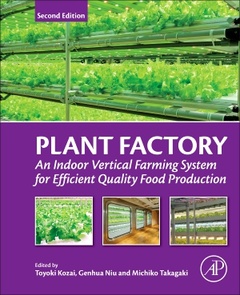Description
Plant Factory (2nd Ed.)
An Indoor Vertical Farming System for Efficient Quality Food Production
Coordinators: Kozai Toyoki, Niu Genhua, Takagaki Michiko
Language: English
Subjects for Plant Factory:
Keywords
808 Factory; AeroFarms; Air current speed; Algae; Annual productivity per unit land area; Appliance farm; Artificial light; Aseptic culture room; Bacteria; Bioenergetics; Boundary layer; Breeding; BrightBox; Building integrated agriculture; Business model; Business workshop; Business; Calcium; Cal-Com; Canopy photosynthesis; Carbon dioxide enrichment; Carbon fixation; Carbon metabolism; CFU (colony-forming unit)Chlorine; Circadian rhythm; City farm; Closed plant production system; CO2 concentration; CO2 use efficiency; Concentration management; Container farm; Controlled environment agriculture; Controlled environment; CTPS (closed transplant production system)Electricity cost; Cultivation panel movement; Culture room; Daily light integral; Data visualization; Decision support; development; Discharge light emission; DLI; Ecosystem; Education; Electrical conductivity (EC)Hydroponic system; Electricity consumption
516 p. · 19x23.3 cm · Paperback
Description
/li>Contents
/li>Biography
/li>Comment
/li>
Plant Factory: An Indoor Vertical Farming System for Efficient Quality Food Production, Second Edition presents a comprehensive look at the implementation of plant factory (PF) practices to yield food crops for both improved food security and environmental sustainability. Edited and authored by leading experts in PF and controlled environment agriculture (CEA), the book is divided into five sections, including an Overview and the Concept of Closed Plant Production Systems (CPPS), the Basics of Physics and Physiology ? Environments and Their Effects, System Design, Construction, Cultivation and Management and Plant Factories in Operation.
In addition to new coverage on the rapid advancement of LED technology and its application in indoor vertical farming, other revisions to the new edition include updated information on the status of business R&D and selected commercial PFALs (plant factory with artificial lighting). Additional updates include those focused on micro and mini-PFALs for improving the quality of life in urban areas, the physics and physiology of light, the impact of PFAL on the medicinal components of plants, and the system design, construction, cultivation and management issues related to transplant production within closed systems, photoautotrophic micro-propagation and education, training and intensive business forums on PFs.
Part 1: Overview and concept of closed plant production system (CPPS) 1. Introduction 2. Role of the plant factory with artificial lighting (PFAL) in urban areas 3. PFAL business and R&D in Asia and North America: Status and perspectives 4. Vertical farming in Europe: Present status and outlook 5. Plant factory as a resource-efficient closed plant production system 6. Micro- and mini-PFALs for improving the quality of life in urban areas 7. Rooftop plant production systems in urban areas
Part 2: Basics of physics and physiology - Environments and their effects 8. Light sources 9. Plant responses to light 10. LED advancements for plant-factory artificial lighting 11. Physical environmental factors and their properties 12. Photosynthesis and respiration 13. Growth, development, transpiration, and translocation as affected by abiotic environmental factors 14. Nutrition and nutrient uptake in soilless culture systems 15. Tipburn 16. Functional components in leafy vegetables 17. Medicinal components 18. Production of pharmaceuticals in a specially designed plant factory
Part 3: System design, construction, cultivation and management 19. Plant production process, floor plan, and layout of PFAL 20. Hydroponic systems 21. Seeding, seedling production and transplanting 22. Transplant production in closed systems 23. Photoautotrophic micropropagation 24. Biological factor management 25. Design and management of PFALs 26. Automated technology in plant factories with artificial lighting 27. Life cycle assessment 28. Education, training, and business workshops and forums on plant factories
Part 4: PFALs in operation and its perspectives 29. Selected PFALs in the United States, the Netherlands, and China 30. Selected PFALs in Japan 31. Representative plant factories in Taiwan 32. Challenges for the next-generation PFALs 33. Conclusions: Resource-saving and resource-consuming characteristics of PFALs
Selected awards are Lifetime Achievement Award (2009) from Society of In Vitro Biology, USA. The 2002 Purple Ribbon Award from Japanese Ministry of Education, Culture and Sports. Japan Prize of Agricultural Sciences from Association of Japanese Agricultural Scientific Societies, 2018 honorary PhD degree from Mahidol University, Thailand ‘The Order of the Sacred Treasure, Gold and Silver Star’ from Japanese Government 2019.
Dr. Genhua is a professor in urban horticulture with Texas A&M AgriLife Research at Dallas and Department of Horticultural Sciences. Her area of expertise is controlled environment agriculture and plant stress physiology. Her current research focuses on hydroponics, nutrition management, LED lighting, optimization of growing environment, and development of best management practices related to urban controlled environment agriculture. She is the co-editor and author of the book “Plant Factory - Indoor Vertical Farming for Efficient Quality Food Production (1st & 2nd edition). Dr. Niu received several awards from Texas A&M University for her service and research, American Society for Horticultural Science, and USDA-NIFA.
Dr. Takagaki is Professor at the Graduate School of Horticulture, Chiba University, assigned to the University Farm, and has engaged in education and research.
In
- Includes coverage of LED technology
- Presents case-studies for real-world insights and application
- Addresses PF from economics and planning, to operation and lifecycle assessment




